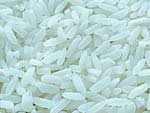 Bloomberg: KRBL Ltd. (KRB), India’s biggest basmati rice exporter, plans to seek new markets in Africa to counter international sanctions against Iran and revive profit amid sliding grain prices. Bloomberg
Bloomberg: KRBL Ltd. (KRB), India’s biggest basmati rice exporter, plans to seek new markets in Africa to counter international sanctions against Iran and revive profit amid sliding grain prices. Bloomberg
By Prabhudatta Mishra
 KRBL Ltd. (KRB), India’s biggest basmati rice exporter, plans to seek new markets in Africa to counter international sanctions against Iran and revive profit amid sliding grain prices.
KRBL Ltd. (KRB), India’s biggest basmati rice exporter, plans to seek new markets in Africa to counter international sanctions against Iran and revive profit amid sliding grain prices.
Rising demand among Indian immigrants and natives of Kenya, Senegal, Nigeria and Ethiopia for the aromatic, long variety may help reverse two years of decline in earnings, Chairman Anil Mittal said in a phone interview. Net income may almost double to 1.25 billion rupees ($23 million) in the year ending March 31, from 730 million rupees in the previous 12 months, he said. The cereal is used to make dishes including biryani and pilaf.
Enlarge image Iran Curbs Drive Rice Exporter to Africa Market
India, the largest grower of basmati rice, controls 65 percent of the overseas market, according to the state-run Agricultural and Processed Food Products Export Development Authority, or APEDA, while Pakistan, the only other main producer in the world, accounts for the rest. Photographer: Kuni Takahashi/Bloomberg
“For us, the new market will be east and west Africa as rising income there drives demand for these products,” Mittal said, without elaborating on the potential volume. “If the entire continent is covered, it will be a big quantity.”
A 25 percent drop in prices of basmati rice in the 12 months to March eroded earnings of the New Delhi-based company, while its shares have plunged 70 percent from a record high reached in October 2010. Trade restrictions on Iran, the world’s biggest buyer of the grain, have resulted in payment hurdles for Indian shippers, prompting KRBL to look elsewhere for growth. The All India Rice Exporters’ Association expects basmati exports to increase 25 percent this year.
Region Specific
India, the largest grower of basmati rice, controls 65 percent of the overseas market, according to the state-run Agricultural and Processed Food Products Export Development Authority, or APEDA, while Pakistan, the only other main producer in the world, accounts for the rest. The rice variety, specific to a geographic region like scotch whiskey, is cultivated in the states of Haryana, Uttar Pradesh and Uttarakhand in India, and in Punjab that straddles both the South Asian countries.
Exports accounted for about 58 percent of KRBL’s revenue in the year ended March 31, 2010, according to data compiled by Bloomberg, with the Middle East making up for more than 50 percent.
Net income dropped 39 percent in the year ended March 31 because of falling prices and currency hedging losses from the rupee’s 12 percent slump against the dollar during the period. The decline in shares has driven its market value down to 5.7 billion rupees from 6.5 billion rupees in March 2011.
The stock fell 0.2 percent to 22.95 rupees at the close in Mumbai today.
“Foraying into new markets is good for any company,” said Batlivala & Karani Securities Pvt.’s Ayyathurai Rajkumar, the only analyst who tracks the stock, according to data compiled by Bloomberg. He rates it underperform, with a one-year target price of 18 rupees.
China Imports
KRBL, which sells the flagship ‘India Gate’ basmati rice, has two processing plants in Punjab and Uttar Pradesh operating below their total capacity of 1.4 million metric tons of paddy a year.
India produced about 5 million tons of basmati rice in the year ended March 31, of which it exported 3.2 million tons. Outbound shipments may increase to 4 million tons in the current year, said M.P. Jindal, president of the All India Rice Exporters’ Association.
China, the biggest consumer of rice, has agreed to allow basmati imports from India after sorting out regulatory issues, the Press Trust of India reported on June 21, citing India’s Foreign Secretary Ranjan Mathai.
India’s northern neighbor can buy as much as 10,000 tons of the grain in the first year, opening up a market closed to Indian shippers, according to A.K. Gupta, an adviser to APEDA.
“We are expecting demand mainly from hotels, restaurants and expatriates,” he said.
Prices Decline
Prices of basmati rice dropped to $845 a ton as of March 31, 2012, from as high as $1,133 in April 2011, according to data provided by APEDA, eroding profit margins for KRBL.
The company has scaled back outbound shipments to Iran after some buyers in the Persian Gulf nation defaulted on payments as the rial slumped amid trade sanctions imposed by the U.S. and the European Union to discourage what they say is the Persian Gulf country’s pursuit of a nuclear bomb. Iran says its atomic program is for peaceful purposes.
Two Iranian private companies owed nine Indian rice exporters about 1.84 billion rupees ($33 million) as of February, Jyotiraditya Scindia, junior trade minister, said on March 14.
KRBL exported as much as 12,000 tons of basmati rice to Iran last year, Mittal said, and expects to capture 10 percent of the 1 million-ton market if the sanctions are lifted.
India exported $2.7 billion worth of goods to Iran in the financial year that ended March 2011, according to the Department of Commerce. Iron and steel items were the biggest category, accounting for $623 million.
“We are zero today in Iran,” said Mittal. “Though I am looking at new markets, the question is of securing payments and how to do business there. Until we are sure about payments, we won’t be able to enter that market.”


